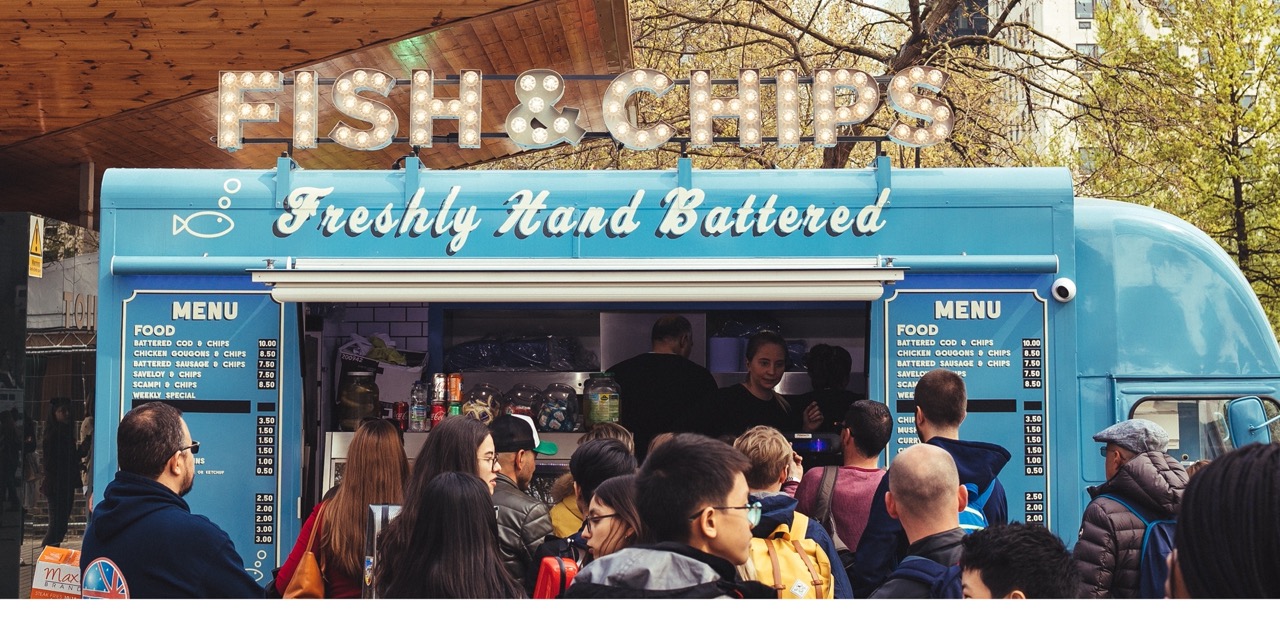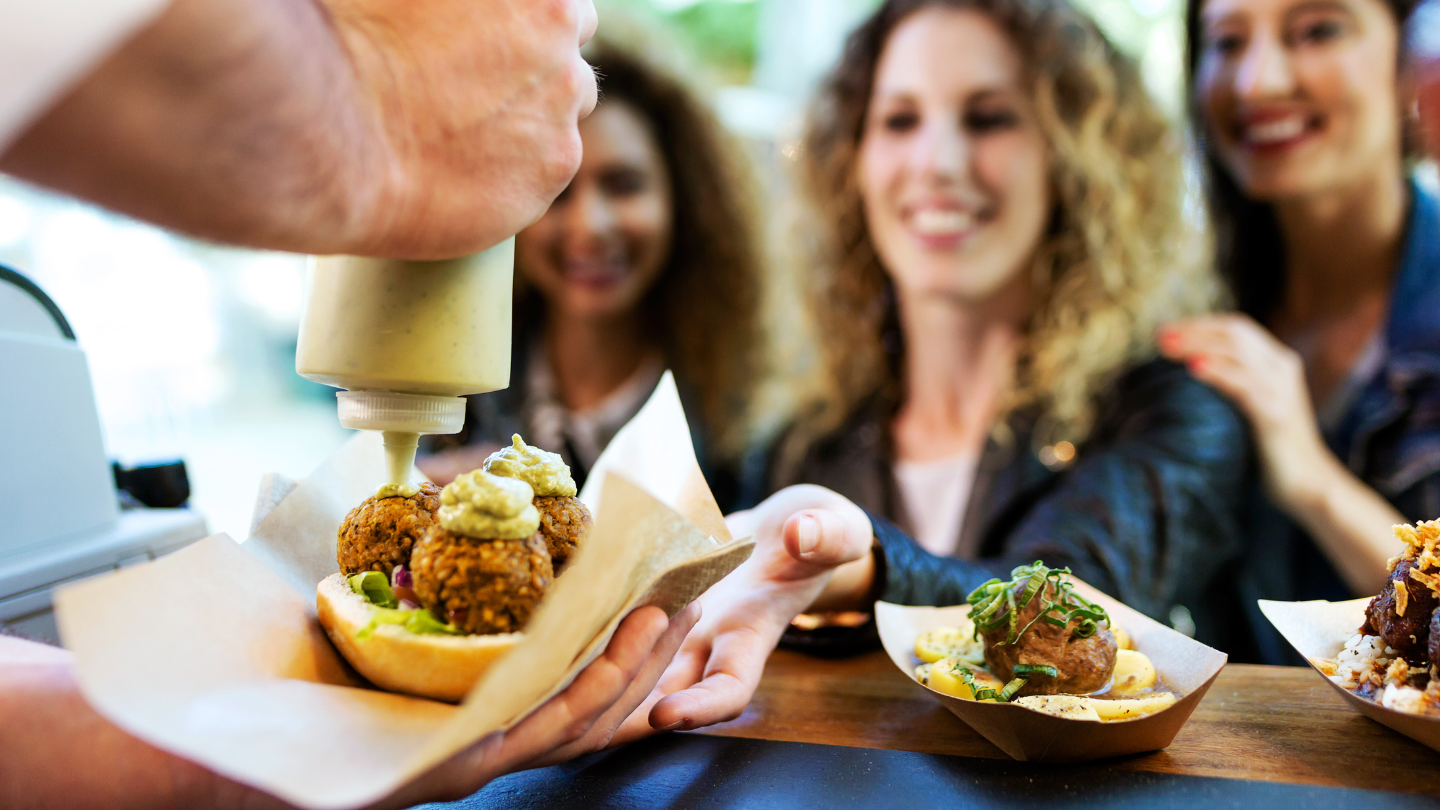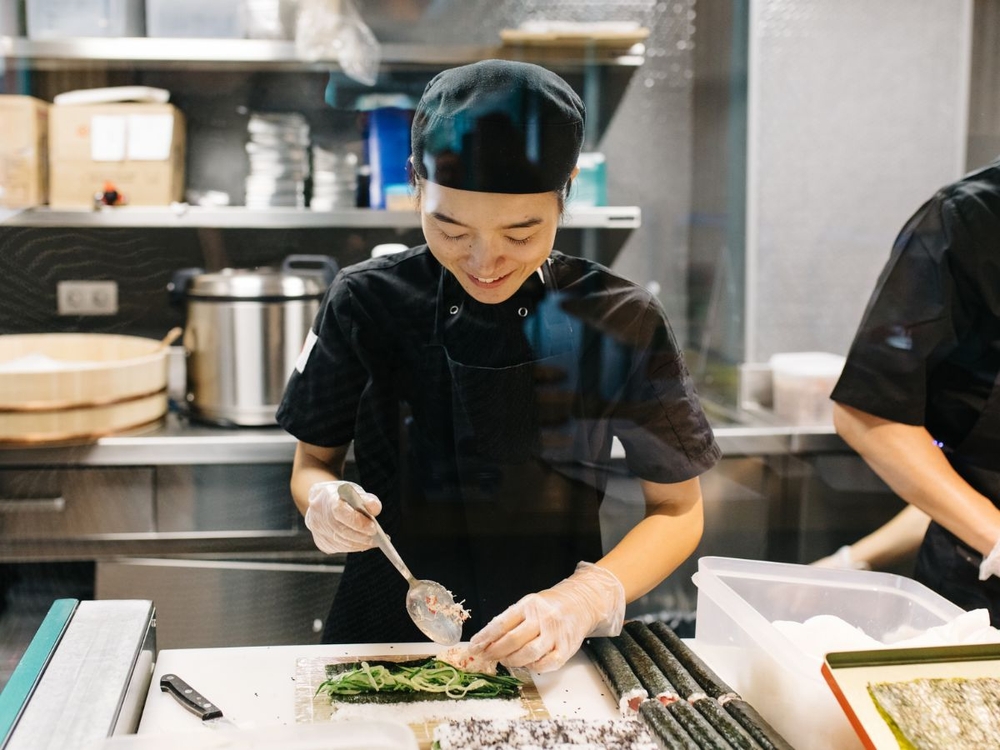Food Truck Commissaries: What Are They?
Table of Contents
CloudKitchens
How many tacos can be delivered from a 1000sqft restaurant?
The same amount as a 200sqft ghost kitchen.

Food truck commissaries: what are they?
We’re in the golden age of food trucks.
Thanks to trailblazers like Roy Choi’s Korean/Mexican fusion Kogi BBQ and the ubiquity of social media platforms like Twitter, the dream of operating a successful mobile restaurant is no longer an illusion. It’s an appetizing reality where you can share your personal culinary story with the world, one street corner at a time.
But have you ever wondered how to start a restaurant or what fuels these mobile gastronomic wonders?
The answer to that is the food truck commissary: an essential ingredient for the success of any mobile culinary adventure.
Square foot squeeze: how food truck commissaries solve the food truck space challenge
A food truck is a compact marvel of modern engineering. It operates as both transportation and kitchen.
But, in exchange for mobility, food trucks must sacrifice square footage. With compactness comes compromise—every square inch is prime real estate. As a result, food trucks often lack the square footage to incorporate the extensive workspace, equipment, and storage area found in even the smallest of commercial kitchens.
As such, they simply can’t accommodate all the requisite amenities and equipment necessary to prepare and store food safely per various health and safety regulations.
Naturally, for food truck owners, this poses a logistical hurdle; conforming to health and safety regulations isn’t a suggestion, it’s mandatory.
Wondering how to start a food truck business? So, How does one adhere to these stringent standards within the tight confines of a food truck?
That’s where our unsung hero—the food truck commissary—plays its part.
What are food truck commissaries?
Food truck commissaries function as a food truck’s base of operations, the place where most of the behind-the-scenes action takes place.
Essentially, commissaries are rentable commercial-grade kitchens and storage facilities where food truck vendors can:
- Safely prepare and store their food
- Have inventory shipped and stored
- Have trucks and cooking equipment maintained and cleaned
- Store their food trucks
In addition to these functionalities, a food truck commissary can also provide business services like administrative support, marketing assistance, and even access to a community of food truck owners who can share advice, experiences, and resources—all without having to own and operate the facility themselves.
Are food commissaries optional?
In many cities, having a commissary isn’t an option, it’s a legal requirement to operate a food truck.
Put simply, in most states it’s illegal to prepare commercial food from a residential kitchen, such as a food truck. Domestic kitchens aren’t designed to meet stringent health and safety regulations that commercial food operations must abide by, such as HACCP (Hazard Analysis Critical Control Point) guidelines and the requirement to undergo regular health inspections.
Additionally, depending on where the food truck operates, there may be other food and safety regulations specific to that region or county, ranging from proper permitting and licensing to the accurate labeling of ingredients and potential allergens.
All of these regulations exist to safeguard public health, and ultimately minimize the risk of foodborne illness.
Food truck commissaries, on the other hand, are licensed commercial facilities that are expressly designed to comply with the area’s regulations. They act as the legal workaround, enabling food truck businesses to operate.
Benefits of food truck commissaries
The benefits of a food truck commissary stretch far beyond the bounds of legal compliance. They serve as an operational linchpin by providing the necessary support and infrastructure lacking in a mobile food truck, including:
- Ample space for food prep: Preparing meals en masse requires ample space. Commissaries provide this essential breathing room and counter space, allowing your team to prep efficiently outside the cramped confines of a food truck. This equates to less time jostling for elbow room and more time crafting your culinary masterpieces.
- Storage and refrigeration: A commissary gives you more offsite pantry and storage space for both ingredients and cooking equipment, which enables food truck vendors to prepare more food than they might need on a particular day and store it for future use, at the proper temperatures to prevent spoilage.
- Hygiene and safety: Commercial kitchens have to secure proper licensing and permits to operate within the law, not to mention enduring regular health and safety audits. Commissaries alleviate this headache by supplying compliant-aligned equipment and relieving you of the task by maintaining and cleaning these stations. This ensures your operations are always up to health code standards, letting you focus on what you do best: creating delicious food.
- Waste management: Waste disposal can be a major hassle. But in a commissary, it’s just one less daily task you need to check off the list. A high-quality commissary will offer built-in waste management systems.
- Business support: From paperwork to parking spaces, commissaries handle much of the back-office concerns involved with running a successful food truck. This might include administrative and marketing assistance, vehicle maintenance, and more. This holistic support system can be a major boon, especially for newcomers to the food truck biz.
- A centralized location: Whether you’re steering a single food truck or a fleet, a commissary kitchen can serve as your mission control. It can act as a centralized location streamlining operations and making it easier to coordinate operations.
- Supplies and equipment: Depending on the commissary, food truck vendors may have access to an array of cooking equipment and supplies. That said, what is made available will likely be contingent on what you’re willing to pay to rent the space.
- Community access: Operating from a food truck commissary often provides access to a community of fellow food truck operators and culinary enthusiasts. This network can be invaluable for sharing resources and fostering lasting partnerships.

Drawbacks of food commissaries
Few solutions come without their pitfalls—and food truck commissaries are no exception. Identifying these drawbacks can help you make an informed choice, while also revealing an enticing alternative: ghost kitchens.
- Costs: Despite shared costs, commissaries can still be expensive to rent. Rent, utility bills, and additional service fees will add up. Even access to a basic commissary can cost more than $1000 per month, and this estimate can increase dramatically if you opt for upgrades like commercial-grade amenities and equipment.
- Remote locations: Although not always the case, many commissary kitchens are located on the outskirts of a city where real estate is cheaper by square footage. This may reduce rental costs but will add other expenses like gas and time spent driving.
- Shared space: Many food truck commissaries, particularly the cheaper ones, are effectively shared spaces. Shared schedules might not always align with your unique requirements; you could be wrestling for prime time slots and essential equipment during peak hours.
- Availability: With more food truck vendors on the road than ever, finding a well-equipped and conveniently located commissary may be a daunting affair. Increased demand causes prices to rise and makes it more difficult to secure a space.
Why ghost kitchens are the superior option
Ghost kitchens, also known as cloud kitchens or dark kitchens, are a relatively new phenomenon in the food industry but have grown increasingly popular in the age of food delivery services.
Unlike traditional restaurant models, ghost kitchens are professional food preparation and cooking facilities set up for the preparation of delivery or food truck businesses. There’s no dining space or storefront. It’s just the kitchen without the front-of-house operations.
While they share similarities with food truck commissaries, their operations and use cases are notably different:
- Specialization: While commissaries are typically set up to comply with any type of food business, ghost kitchens often provide specialized facilities designed to accommodate certain types of cooking and to facilitate the online delivery aspect.
- Private kitchen space: There’s no need to share a space or work out a split schedule when you operate out of a ghost kitchen. You get access to a space that’s yours and yours alone—one that can be modified to accommodate your specific needs.
- Centralized location: Because they’re geared toward delivery services, the best ghost kitchens will be centrally located, in the heart of a city’s delivery demand such as our ghost kitchens in Austin and commercial kitchens in Los Angeles. For food trucks, this central location enables you to run your business as efficiently as possible at a minimal cost.
- Rapid set-up time: A brand-new ghost kitchen can go from concept to fully functional in as little as 4 weeks.
Two birds, one stone – Why not just run a food truck when you could also be running a successful food delivery service from the same location, and at marginal additional cost? Top ghost kitchens will provide the logistics and fulfillment support as well as the proprietary technology that makes building out a delivery service a breeze.
Find your ideal ghost kitchen from CloudKitchens
In the era of food trucks, food commissaries have become an indispensable component of running a thriving business. But like an enticing menu item that evolves with a dash of innovation, the industry is discovering a new favorite dish in the form of ghost kitchens.
As we’ve explored, traditional food truck commissaries, despite their numerous benefits, do present challenges that can deter even the most ardent food truck entrepreneur.
Join CloudKitchens today. We provide a novel solution for food truck operators by marrying the advantages of commissaries with the adaptability, scalability, and cost-efficiency of ghost kitchens.
| DISCLAIMER: This information is provided for general informational purposes only and the content does not constitute an endorsement. CloudKitchens does not warrant the accuracy or completeness of any information, text, images/graphics, links, or other content contained within the blog content. We recommend that you consult with financial, legal, and business professionals for advice specific to your situation. |
Sources:
Thrillist. How Roy Choi Kicked off the Food Truck Revolution That Changed the Way Americans Eat. https://www.thrillist.com/eat/nation/roy-choi-kogi-food-truck-revolution
More insights & stories
There’s more where that came from.
Get in the know and check out our additional insights


